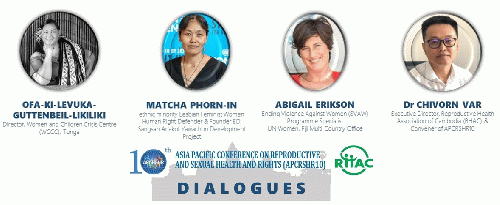
End all sexual and other forms of gender-based violence
(Image by CNS (Citizen News Service citizen-news.org)) Details DMCA
Preventing sexual and other forms of gender-based violence (SGBV)
before it happens and meeting the needs of all survivors should always be a
priority - but it becomes even more of a compelling priority during pandemics
and other emergencies. Such crisis situations might exacerbate already existing
risks of SGBV. The coronavirus disease (COVID-19) pandemic has forced upon us a
reality check on progress (or lack of it) made on the gendered responses to end
SGBV.
Confinement is expected to increase risks of intimate partner violence as well
as reduce access to regular lifesaving SGBV services, said Dr Chivorn Var,
Executive Director of Reproductive Health Association of Cambodia (RHAC) and
Convener of 10th Asia Pacific Conference on Reproductive and Sexual Health and
Rights (APCRSHR10). In China
during the pandemic, the number of domestic violence complaints to the local
police station tripled. In India during the lockdown, the number of domestic
violence complaints almost doubled.
"The Pacific island countries have some of the highest recorded rates of
SGBV with nearly 2 out of 3 (67%) women experiencing sexual or physical
violence by a partner. The violence is recurrent and severe and impacts women,
girls, children, families, and communities at large. While there are few very
good crisis support services for survivors of SGBV, they are generally confined
to the capital cities and are not always available in rural and remote
areas" said Abigail Erikson, Ending Violence Against Women
Programme Specialist, UN Women, Fiji Multi-Country Office.
Intimate partner violence in Cambodia
Dr Chivorn Var shared that "intimate partner violence is the most
common form of violence faced by Cambodian women. 20% of Cambodian women have
reported physical or sexual violence and 32% of women have ever experienced
emotional violence by an intimate partner. The health consequences of such
violence are devastating, and 66% of intimate partner violence survivors
reported adverse physical and mental health consequences. A Cambodian national
survey reveals that sexual abuse before age 18 is also an urgent concern. The
common perpetrators of sexual abuse and violence against women have been
identified as husbands, siblings, relatives, neighbours, friends, and intimate
partners."
In Cambodia, schools and most businesses are closed due to COVID-19 but it is
not mandatory to stay home. There does not seem to be any noticeable increase
in the cases of SGBV due to the pandemic. But some organizations that were
providing shelter homes for violence survivors have closed this service for
those who are not in life threatening situations. "But it does not mean
that the problem [of SGBV] does not happen in the communities and in the
families" pointed out Dr Var.
Sexual and gender-based violence exacerbated in Tonga
"In Tonga more than 80% cases of sexual violence, including girl
child sexual abuse cases as well as rape and incest cases, happen within the homes.
25% Tongan women have experienced either physical or sexual violence in their
lifetime. But majority of the support and response services - like legal aid
service, safe houses or shelter homes, counselling services, sexual and
reproductive health services - for survivors of SGBV are centred in the main
island. Women and children living in the 5 outer Tongan islands do not have
direct access to all of these services" said Ofa-Ki-Levuka
Guttenbeil-Likiliki, Director of Women and Children Crisis Centre (WCCC),
Tonga.
There has been an exacerbation of SGBV on women and girls in Tonga due to the
pandemic. Typically, in a month, WCCC gets 20-24 new SGBV cases. But in the 15
days period of lockdown alone they had 20 cases. A high number of cases were
reported to the police as well.
Although the suddenness of COVID-19 created a sense of panic, but the response
was quick too. The online counselling services of WCCC were ramped up fast. All
counsellors were given mobile phones and underwent a fast and rigid training on
how to provide services in a woman's home setting during lockdown period while
maintaining confidentiality and ethics. This was no easy task as a typical
Tonga home usually consists of at least 8 or 10 family members, said
Ofa-Ki-Levuka Guttenbeil-Likiliki.
She added that online social media platforms, such as Facebook, were also used
to communicate with the women. Police support was taken to help the women - who
walked out of their homes to escape violence - reach the support centres,
without being turned back at the border checkpoints and without having to face
the humiliation of narrating their story at every checkpoint.
(Note: You can view every article as one long page if you sign up as an Advocate Member, or higher).





